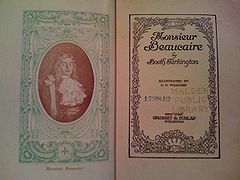- Monsieur Beaucaire (novel)
-
Monsieur Beaucaire 
Frontispiece of an early editionAuthor(s) Booth Tarkington Country United States Language English Publisher Doubleday Publication date 1900 Media type Print (Hardcover) ISBN 1117894053 Monsieur Beaucaire is a short novel by Pulitzer Prize-winning author Booth Tarkington that was first published in 1900.[1]
Plot
The setting is Bath during the eighteenth century. Before the action of the novel begins, Beau Nash, an historical figure who served as Master of Ceremonies of Bath, has ordered M. Beaucaire out of the public rooms because of his low status. A barber to a French noble, Baeucaire has since that incident established a reputation for honesty while gambling with English notables in private.
In the opening scene of the novel, he catches the Duke of Winterset cheating and threatens to expose the Duke, whose honesty is already the subject of gossip. Beaucaire insists Winterset take him to a ball and introduce him as the Duc de Chateaurien to Lady Mary Carlisle, “the Beauty of Bath."[2] Beaucaire as Chateaurien wins the lady’s affection and the admiration of Bath society.
In the days that follow Beaucaire twice emerges successfully from duels with men who pretend to insult him on their own behalf but are in fact acting on behalf of Winterset.
Beaucaire and several British gentlemen accompany Lady Carlisle en route from a party. Beaucaire and Lady Carlisle engage in amorous conversation. Highwaymen attack Beaucaire shouting “barber!” and the others leave him to defend himself. He does so successfully for a time, then is overwhelmed, only to be rescued at last by his servants who were travelling some distance behind. Lady Carlisle denounces those who failed to come to Beaucaire’s defense. Winterset then emerges from the shadows and, over Lady Carlisle’s objections and with Beaucaire’s indulgence, tells the story of Beaucaire’s true background as a lackey and an imposter, adding some fabrications to explain his own behavior in introducing Beacaire/Chateaurien to Bath society. Beaucaire mocks his words as a mixture of truth and invention. Questioned by the others, he asserts he has never been a barber but admits that he did arrive in England in the role of barber to the French Ambassador and is named Beaucaire. One of the English, Molyneux, the only one to demonstrate some sympathy for Beaucaire, notes that his swordsmanship was that of a gentleman. Winterset warns Beaucaire not to appear in public in Bath again. Lady Carlisle, aghast, refuses to look at Beaucaire and orders her carriage to depart.
That even Lady Carlisle and Winterset are the center of attention in Bath as Nash and fashionable society anticipate the arrival of the French Ambassador and the Comte de Beaujolais, a French prince. The movement of the crowd impels Lady Carlisle to step aside into a small chamber where she finds Beaucaire and Molyneux gambling. Attempts at explanation fail, Lady Carlisle insists that Molyneuz escort her from the room, and Beaucaire is left alone in tears.
After more confrontations, Beaucaire reveals himself as a French prince, hiding from his cousin, King Louis XV of France, who is angry at him for failing to submit to an arranged marriage. The Ambassador has come to Bath to escort him home now that his royal cousin has relented. In the course of recounting his adventures, Beaucaire calls Winterset "that coward, that card-cheat."[3] Lady Carlisle asks his forgiveness and he gives it lightly. He announces his intention to return to France and marry the woman the king had chosen for him.
Adaptations
The story has been adapted several times. It was adapted as a play in 1904 starring Evelyn Millard and Lewis Waller. The play received a Royal Command Performance at Windsor Castle before Edward VII. André Messager used it as the basis for an operetta of the same name in 1919. A 1924 film adaptation on which Tarkington was credited as co-author of the screenplay starred Rudolph Valentino.[4] Another film released in 1946 featured Bob Hope.[5] A loose adaptation of the story served as the basis for the 1930 film Monte Carlo directed by Ernst Lubitsch and starring Jeannette MacDonald.[6]
References
- ^ Booth Tarkington, Monsieur Beaucaire (NY: Grosset & Dunlap, 1900)
- ^ Beaucaire, 25
- ^ Beaucaire, 111
- ^ Internet Movie Database: Monsieur Beaucaire (1924), accessed May 10, 2010
- ^ Internet Movie Database: Monsieur Beaucaire (1946), accessed May 10, 2010
- ^ Internet Movie Database: Monte Carlo (1930), accessed May 10, 2010
Categories:- 1900 novels
- American novels adapted into films
- American historical novels
- Novels set in Somerset
Wikimedia Foundation. 2010.
